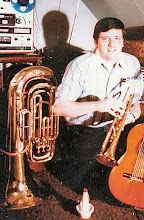at New Orleans Jazz Fest
 New Orleans legend Pete Fountain plays with his granddaughter,
New Orleans legend Pete Fountain plays with his granddaughter,
Danielle Scheib on the washboard at the Economy Hall Tent during his set Sunday at Jazz Fest.
Twenty minutes before Pete Fountain's Sunday afternoon set at the New Orleans Jazz Fest, Melissa Ensley of Slidell settled into a second-row seat, and turned to me with a question?
"So are you a big Pete Fountain fan?"
As I was about to reply, she pulled from her bag a vintage copy of Fountain's 1964 LP "Licorice Stick," showing off the fresh autograph on the cover. "My earliest musical memory was listening to this with my dad," she said. "We come to see Pete Fountain every year. We can't miss him."
Clearly that was the collective feeling in the Economy Hall tent, where people packed the aisles 10 deep. When the 80-year-old great-granddad of New Orleans traditional jazz climbed onto the stage, surrounded by his seven-piece band, the crowd roared up, clapping and whistling, cell phone cameras held aloft.
A standing ovation before he played his first note. It would be one of four he'd receive during the hour-long set. Hurricanes and health problems may have taken a toll on Fountain, slowing him down a bit, but he still knows how to grab the audience and force them out of their chairs. With Tim Laughlin accompanying on clarinet, he pumped out the old favorites - "Clarinet Marmalade," "Up the Lazy River," and "Basin Street Blues," - his feet tapping to the music.
For "St. Louis Blues," his granddaughter, Danielle Scheib, 32, joined him on washboard, her spoons zipping over the metal surface adding a Zydeco beat. At the end of the song she gave gramps a hug, prompting another roar from the audience.
Dressed in an untucked blue and white button down and white pants, Fountain shared the microphone with Laughlin, tag teaming it through "A Closer Walk With Thee," and "Struttin' with Some BBQ," backed up by Mark Mullins on trombone, Connie Jones on coronet, Tom Maggiore on sax, Olivier "Sticks" Felix on bass, Allyn Young on guitar and John Royen on piano. As he wound into "When the Saints Go Marching In," with Scheib back on the washboard, a second line snaked through the aisles, umbrellas in the air, handkerchiefs waving.
At the end of the song, Fountain bowed to the roaring applause, put his flat cap on his head and exited stage right. A crowd gathered by the barricades, calling out for autographs and photos.
In the second row, Ensley packed up her LP. "With that, we're going home for the day," she said. "Nothing can beat it."
Credits: Published: Sunday, May 01, 2011, 7:30 PM
By Susan Langenhennig, The Times-Picayune NOLA.com







